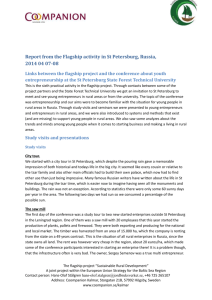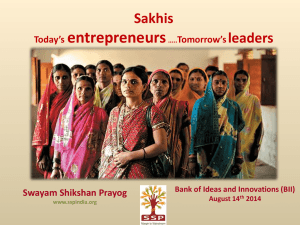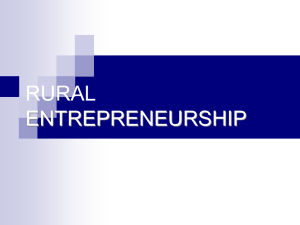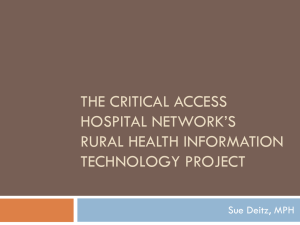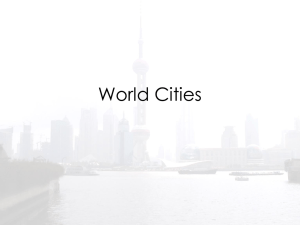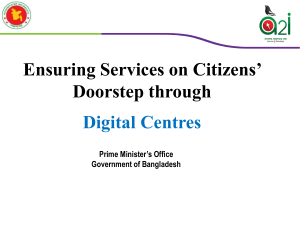Report from the Flagship activity in St Petersburg, Russia
advertisement
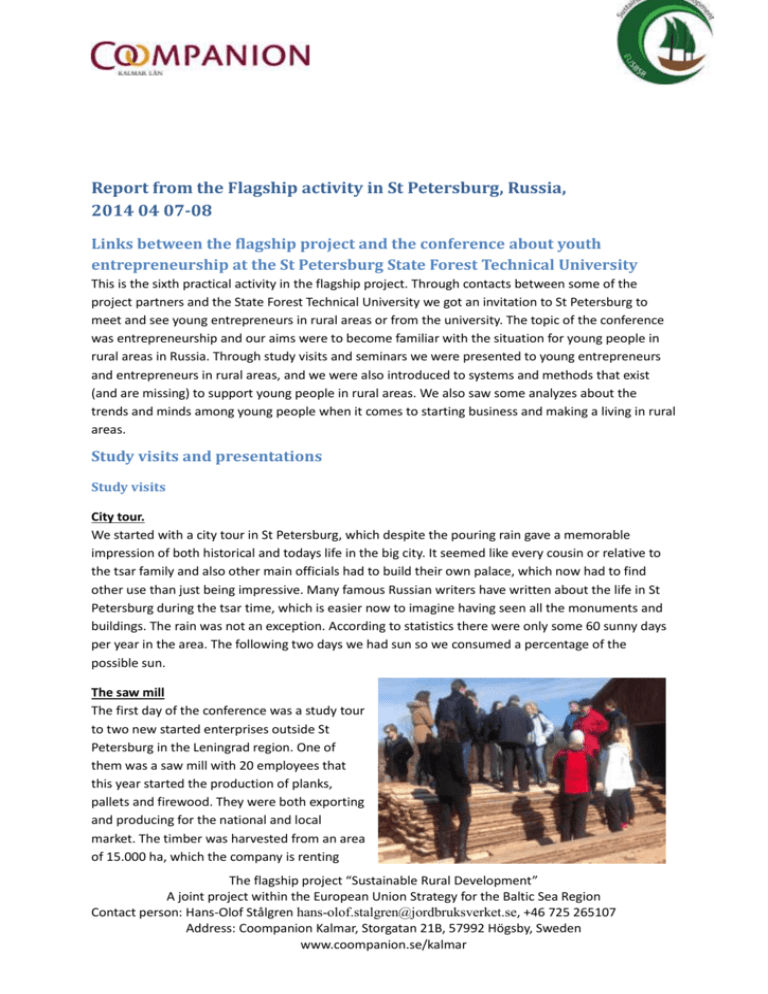
Report from the Flagship activity in St Petersburg, Russia, 2014 04 07-08 Links between the flagship project and the conference about youth entrepreneurship at the St Petersburg State Forest Technical University This is the sixth practical activity in the flagship project. Through contacts between some of the project partners and the State Forest Technical University we got an invitation to St Petersburg to meet and see young entrepreneurs in rural areas or from the university. The topic of the conference was entrepreneurship and our aims were to become familiar with the situation for young people in rural areas in Russia. Through study visits and seminars we were presented to young entrepreneurs and entrepreneurs in rural areas, and we were also introduced to systems and methods that exist (and are missing) to support young people in rural areas. We also saw some analyzes about the trends and minds among young people when it comes to starting business and making a living in rural areas. Study visits and presentations Study visits City tour. We started with a city tour in St Petersburg, which despite the pouring rain gave a memorable impression of both historical and todays life in the big city. It seemed like every cousin or relative to the tsar family and also other main officials had to build their own palace, which now had to find other use than just being impressive. Many famous Russian writers have written about the life in St Petersburg during the tsar time, which is easier now to imagine having seen all the monuments and buildings. The rain was not an exception. According to statistics there were only some 60 sunny days per year in the area. The following two days we had sun so we consumed a percentage of the possible sun. The saw mill The first day of the conference was a study tour to two new started enterprises outside St Petersburg in the Leningrad region. One of them was a saw mill with 20 employees that this year started the production of planks, pallets and firewood. They were both exporting and producing for the national and local market. The timber was harvested from an area of 15.000 ha, which the company is renting The flagship project “Sustainable Rural Development” A joint project within the European Union Strategy for the Baltic Sea Region Contact person: Hans-Olof Stålgren hans-olof.stalgren@jordbruksverket.se, +46 725 265107 Address: Coompanion Kalmar, Storgatan 21B, 57992 Högsby, Sweden www.coompanion.se/kalmar from the state on a 49 years contract. This is the situation of all rural enterprises in Russia, since the state owns all land. The rent was however very cheap in the region, about 20 euros/ha, which made some of the conference participants interested in starting an enterprise there! It is a problem though, that the infrastructure often is very bad. The owner, Sergey Semenov was a true multi entrepreneur. He also made some money on cows, pigs and hens and he took part in running the local food store. Besides this he was also a member of the community council. The horse breeder The second visit was at a horse breeding company, owned by a former salesman and forester who wanted to try something new. In fact it was a long nurtured dream of him and his wife. They had 60 horses and were one of most successful horse breeders in Russia. Two years ago they achieved a price for the best horse breeding company in the country. Because of that the company had got a grant from the state for about 200 000 euros to set up new stables. This Grant was actually for other types of farms and this company was the first horse company in the region to achieve it. Apparently you can get as much as 60 % of the costs, but not more than 500 000 euros, in support from the government. Presentations During the day number two we had the opportunity to be in the St Petersburg State Forest Technical University of Forestry where we had three presentations together with an introduction explaining the theme and scope of the flagship project. Youth and rural entrepreneurship in Leningrad Region After an introductory presentation of the university by Mrs Svetlana Tereshchenko, vice-dean for international relations at the Faculty of Economics and Management Mr Mikhail Krylov, teacher at the university, gave a basic presentation of the situation for Youth and rural entrepreneurship in the Leningrad Region. Whit almost 2 million inhabitants in the official registers St Petersburg is a big center in the region. Counting the not registered inhabitants the number is much higher. The statistics tell that over 500 000 live in the rural areas. There is a constant inflow of new inhabitants but they are coming to the city and not to the rural areas. Small private businesses is a quite a young phenomenon in Russia whose economy mainly is based on large manufacturing and mining industries. About 29% of the businesses and only 10% of the employees in the region are in the small businesses. The attitude towards running a business is not so positive. The interest for business has in fact The flagship project “Sustainable Rural Development” A joint project within the European Union Strategy for the Baltic Sea Region Contact person: Hans-Olof Stålgren hans-olof.stalgren@jordbruksverket.se, +46 725 265107 Address: Coompanion Kalmar, Storgatan 21B, 57992 Högsby, Sweden www.coompanion.se/kalmar decreased during the last years. Being a civil servant or an employee in a state owned company has much higher status. The frequent changes in the “rules of the game”, high barriers to start a business and the threats of “administrative rent” makes it even less attractive. In a poll among youth only 6% were interested to start and run a business on their own. There is though a change going on but mainly it is within the city area. “Technoparks” are opened in many places to support the start up of small businesses. Public organisations, business clubs, have been started in St Petersburg to support young entrepreneurs to get started. Another initiative called “Ladoga” with the same aim has been started in the Leningrad District. The program “Development and the state support of small and average business in Leningrad region for 2009-2013” gives support and grants up to 80% to start new businesses. There are though problems related to taxation and other legal aspects of running a business that demotivate people. In rural areas it might be even worse. Production classified as “country business” is mostly for personal consumption and carried out on “datchas” owned by urban people. The industrial agricultural production is developing and has a support from both the state and the agri-industrial groups. But it is mostly concentrated to animal production. The farming business (more family farms) is developing but very slowly. There is a very low interest from the state to support these farming businesses and there is a lack of both knowledge and proper infrastructure. Processing berries and agro tourism is believed to be potential areas of development for family farms. But knowledge transfer and exchange of experience of startup businesses are some of the necessary steps to be taken. Cooperation with other countries, especially regarding young entrepreneurs would be very useful. My Business Experience, Daria Temkina As a First-year student graduate at the St Petersburg State Forest Technical University of Forestry has a long record of different business approaches she has been running for longer or shorter time since 2010. Several of them have been summer bars and events but there is also a cleaning company in the list and a design business. The list is: Fresh Home (2010) A cleaning service offering ecological cleaning, without any chemicals. Out Party Bar (2011) Outdoor bar more than 700 cocktails, fire shows and thematic parties. The flagship project “Sustainable Rural Development” A joint project within the European Union Strategy for the Baltic Sea Region Contact person: Hans-Olof Stålgren hans-olof.stalgren@jordbruksverket.se, +46 725 265107 Address: Coompanion Kalmar, Storgatan 21B, 57992 Högsby, Sweden www.coompanion.se/kalmar Santa Cruz (2011) A summer bar Feel the Creative (2013) Handmade cases for Apple products Royal Smoke (2014) A Luxury Hookah Bar All the different businesses have been run without big investments and very often with the help of friends. A network with good connections in the business world and in the public administration has been an advantage. One major idea has been to make money on her own without depending on her parents´ economy. Another idea has been simply to make something fun for herself and her friends. It has for sure been a lot of hard work and late hours but it has given a profit and lots of experience. Youth Business in Russia, Dmitriy Zaytsev (disoks@gmail.com) “Hello, I´m Dimitry. I create content”, was the opening phrase in his presentation. Most of the business ideas were connected with or totally based on internet and social media. In a very strategic way he has a plan for how to build business for the future. His major plan has four different legs. Today, have small private sales on e-bay and similar channels. Passive, having a Youtube channel or web pages with enough followers to get a passive income by advertising for something. In Dimitri´s case it is camping and outdoor equipment. Long term, a plan for a more permanent serious business. Reserve, getting an education to be able to take a “back-up employment”. In Dimitri´s case it is an education Forestry Policy at the St Petersburg State Forest Technical Univ. of Forestry. Some of the main aspects of entrepreneurship according to Dimitri is that the internet and social media together with the trend for resale instead of production of original products makes it quite easy to start a business. “Work better in your own field and go into new fields carefully”. The customer base and its´ extension and the customer loyalty is the main thin. People gradually leave from the internet to social media. So if you have an “army of fans” (that is followers) you can sell almost anything. Focusing on online promotion and integrate it into the social media gives business opportunities which are not limited to you city or country. Some final advice and reflections were: If you long to do something – all will be realized Everything is decided by experience Connections solve even more Create an army of loyal fans, and success will come The flagship project “Sustainable Rural Development” A joint project within the European Union Strategy for the Baltic Sea Region Contact person: Hans-Olof Stålgren hans-olof.stalgren@jordbruksverket.se, +46 725 265107 Address: Coompanion Kalmar, Storgatan 21B, 57992 Högsby, Sweden www.coompanion.se/kalmar Social networks is important (internet advertisement) The earlier you start - the better Always write down your thoughts and ideas Learn Chinese language - it will come in handy Reflections General reflections: The main impression of the conference was that there is not any developed support system for young rural entrepreneurs in the Leningrad region and in St Petersburg. The kind of support that can be achieved is not easy accessible for everyone. It seems also like the area is dominated by big and heavy industries so the culture of small entrepreneurs is not so developed. It might not be a large demand for entrepreneurship support. As Mikhail Krylov from the university pointed out the concept of private entrepreneurs does not have any long history in Russia. We met several successful entrepreneurs with strong driving force but they started with their own money or borrowed from friends. Once proven successful it was possible to get some subsidies. Good connections in the public administration seemed to be an advantage. It was also stated in one of the presentation that a requisite for running business was named “administrative rent”. Managing and thriving as a business in such an environment fosters flexibility and ability to handle sudden changes. The strong role of the state was pointed out by many of the participants exemplified that almost no land or forest could be owned but just rented. This might cause a lower grade of attention to or concern for the land or forest since you just have responsibility (or can make a profit) during the time of the lease. It was also striking that the rural areas we saw seemed to be very much poorer than the urban areas. One of the participants said it almost looked “abandoned”. Also the big differences in economic level in St Petersburg city were noticed by many. Vary many fancy expensive cars blended with cars of very low standard. There were impressing buildings and many castles but also houses which totally lacked maintenance. Another fact that surprised many of the participants was pointed out in one of the presentations. In a survey among youth as many as 21 % wants to be employed by "Gazprom", 15 % want to work in a public office and 14 % want to work in police or Office of Public Prosecutor. Only 6 % of the youth wants to run a private business on their own. Bad infrastructure especially in rural areas, a lack of training in and support for entrepreneurial thinking and a heavy bureaucracy was mentioned by the participants as some of the big challenges for the Russian society. A general mindset of being employed by someone instead of creating and running an own business is a big obstacle for developing more SME:s. The flagship project “Sustainable Rural Development” A joint project within the European Union Strategy for the Baltic Sea Region Contact person: Hans-Olof Stålgren hans-olof.stalgren@jordbruksverket.se, +46 725 265107 Address: Coompanion Kalmar, Storgatan 21B, 57992 Högsby, Sweden www.coompanion.se/kalmar At the sawmill Sergey Semenov received us at his saw mill. It was obvious that he started from early years as an entrepreneur. It was a way of living and his business was also connected to the local area where his family had their roots. Now the impression was almost feudal according to some of the participants. About 50% of the employees were guest workers from other states in the Russian federation. Sergey provided housing for them and was also running the village grocery shop for which he himself also produced the eggs. Many participants reflected that it seemed to be important to have good social connections to be successful. For the community Sergey created jobs and kept the village alive so there was a mutual benefit to have good relations. The fact that the state was the only owner of all the forests and that entrepreneurs had to run in a competition for long time lease contracts was new for most of the participants. It was not easy to understand how the business was funded, if everything was done with own private capital or if there were loans or other forms of support. Maybe it is not polite to ask such questions or not common to reveal such details of your company. Nevertheless it was clear that Sergey was a very capable business man with the focus on developing both his business and the area. The horse breeding farm Here we met another Sergei with a big heart for horse breeding and behind him was his wife with maybe an even bigger passion for horses. He was not young but he was for sure an entrepreneur. It was interesting to know that he had been working for many years in shipping and also been running a care sales business but now landed where he had his hart (and his wife). They had got a large investment grant from the state but only after proving they were one of or even the best breeder of sports horses in the Russian federation. The focus was to be on top in The flagship project “Sustainable Rural Development” A joint project within the European Union Strategy for the Baltic Sea Region Contact person: Hans-Olof Stålgren hans-olof.stalgren@jordbruksverket.se, +46 725 265107 Address: Coompanion Kalmar, Storgatan 21B, 57992 Högsby, Sweden www.coompanion.se/kalmar taking care of horses with problems but good genes and breed the best sports horses in Russia and even in Europe. Daria Temkina with a cleaning company and the summer bar companies Daria had a strong wish to create something on her own and not rely on the money of her parents. Another driving force was obviously to do something fun and memorable together with her friends but in a way that it made some profit. She was not afraid of working hard. The funding was mainly by small loans from friends and private own capital. On a question about how such a young entrepreneur can get license to serve alcohol and run summer bars there was not any clear answer. Our interpretation was either that it was a lack of knowledge or that she had friends with connections in the authorities. It was a bit puzzling. It seemed like she did run one company for just one season and then started a new one the next season. If this was due to a business strategy or competition or just because the studies during the rest of the year were too time consuming, was not clear. In the list of companies run by Daria was not only summer bars but also a cleaning company and a design company. The question is how she will run and develop the businesses when she has graduated. Dimitri Zaitsev with the Youtube channel It was a very clear and strategic plan for how to build a future as an entrepreneur. Having a “passive” income, something that was generating a steady income, even if it was not so big, was the first step achieved by having a Youtube channel with advertisement for camping equipment. Running another company selling plants required more job but could give more profit if it was run well and was developed. Then the long term insurance was the university education giving access to possible good employments in the future. Among the participants was one with the exact same approach running a Youtube channel as well. Both the businesses in which Dimitri was involved did not require a lot of investments, which is wise for a young entrepreneur in Russia but for sure even in other countries. These multifunctional differentiated business ideas give several legs to depend on and create a more sustainable entrepreneurship. Seeing business opportunities in new technology or new circumstances is typical for an entrepreneur. Using Youtube and social media to create a business with almost no investment is a very entrepreneurial way of thinking. Background to other activities in the flagship project The conference in St Petersburg was the sixth practical activity in the project since it started in Ronneby (Sweden), September 2012. During 2013 the project participated in three conferences in Mikkeli (Finland), Krakow (Poland) and Jurmala (Latvia) on the topic rural, youth entrepreneurship. In the end of the year there was a learning conference in Poznan (Poland), were the results so far was discussed and summed up. The last activity was in the beginning of June 2014 in Kaunas (Lithuania), where seven young people from Latvia and Sweden interviewed LAG-groups in a Leader fair about their youth activities. So far more than 120 people from the different countries have participated in the activities and contributed with their reflections and ideas. The flagship project “Sustainable Rural Development” A joint project within the European Union Strategy for the Baltic Sea Region Contact person: Hans-Olof Stålgren hans-olof.stalgren@jordbruksverket.se, +46 725 265107 Address: Coompanion Kalmar, Storgatan 21B, 57992 Högsby, Sweden www.coompanion.se/kalmar Planned activities in the flagship project The next year is the last year of the project, when all the conclusions and good methods will be compiled in one report and presented to political leaders and decision-makers in the participating countries. Before that there will be at least two more practical activities, one in Hallsberg (Sweden) in September and one in Jurmala (Latvia) in October 2014. In November the second learning conference in the project will be organized in Sweden, were the draft report will be presented, complemented and discussed. Probably there will be one or two more practical activities in the end of 2014 and the beginning of 2015. After all the dissemination seminars have been held in March, there will be one final sharing and celebrating conference. The conference program Day one, sixth of April • Arrival in St Petersburg • Guided bus tour in the city • Common dinner Day two, seventh of April • Excursion to Vyborgsky Region of the Leningrad Region, visiting rural enterprises ▪ First study visit to a saw mill company ▪ Second study visit to a horse breeding company • Joint dinner • Seminars at State Forest Technical University: • Presentation of the university • Presentation of the flagship project • Lecture on youth entrepreneurship in Leningrad Region Mikhail • Presentations from two young entrepreneurs Daria and Dimitri • Discussion among the participants about the experiences from the conferences • Closing of the conference The flagship project “Sustainable Rural Development” A joint project within the European Union Strategy for the Baltic Sea Region Contact person: Hans-Olof Stålgren hans-olof.stalgren@jordbruksverket.se, +46 725 265107 Address: Coompanion Kalmar, Storgatan 21B, 57992 Högsby, Sweden www.coompanion.se/kalmar Participants list Name Martin Martin Kerttu Evelin Aivar Sonja Marita Jurijs Zane Liāna Gatis Viktorija Baiba Mateusz Łukasz Agata Jacek Paweł Svetlana Mikhail Hans-Olof Eva Joakiml Niklas Arvid Organisation Repinski Kukk Young farmer, Ltd R Capital, goat farming Traineeship in the Estonian Ministry of Agriculture, studying agronomy at the Copenhagen University Mäger PhD student in law in Tartu University Urm owner of the one-year-old design enterprise Niinemägi LAG Pandivere Development and Incubation Centre Miettinen Mikkeli University of Applied Sciences Mattila Mikkeli University of Applied Sciences Brente Latvian Young Farmers Club Ģierte Latvian Young Farmers Club Murāne Latvian Young Farmers Club Gailītis Latvian Young Farmers Club Reine LV Rural Network and the Rural Dev. Advisory Center Bērziņa Latvian Young Farmers Club Grojec Agricultural Advisory Centre in Brwinów Branch in Krakow Jawny Agricultural Advisory Centre in Brwinów Branch in Krakow Markuszewska Zespół Koordynacji Krajowej Sieci Obszarów Wiejskich Fundacja Programów Pomocy dla Rolnictwa FAPA" Kucybała Agricultural Advisory Centre in Brwinów Branch in Krakow Opach Agricultural Advisory Centre in Brwinów Branch in Krakow Tereshchenko Saint Petersburg State Forest Technical University, Faculty of Economics and Management Krylov Saint Petersburg State Forest Technical University, Faculty of Economics and Management Stålgren Coompanion Kalmar County Engström Coompanion Kalmar and SLU Stålåker Vi Unga Uppland Björkegren Leader Upplandsbygd Stiernström U-land, Leader Upplandsbygd Country EE EE EE EE EE FI FI LV LV LV LV LV LV PL PL PL PL PL RU RU SE SE SE SE SE The flagship project “Sustainable Rural Development” A joint project within the European Union Strategy for the Baltic Sea Region Contact person: Hans-Olof Stålgren hans-olof.stalgren@jordbruksverket.se, +46 725 265107 Address: Coompanion Kalmar, Storgatan 21B, 57992 Högsby, Sweden www.coompanion.se/kalmar
